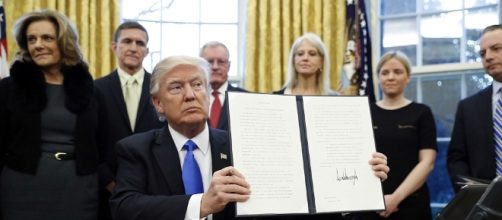It's been reported that President Trump's executive order for a travel ban on Muslims had been struck down by the U.S. fourth circuit court of appeals. After holding arguments, in a majority decision issued by Chief Judge Roger Gregory, it was determined that the administration's framing of the words used for the sake of "national security" were too vague against the blatant context of religious intolerance. While the ruling is further confirmation of this administration's overall intolerance, it should be noted that their executive order and their argument to defend it was also built on a foundation of specific racial intolerance.
The racist, discredited argument Trump’s DOJ just made in a federal court https://t.co/s2Xibf0skH pic.twitter.com/wdxtWiOcVl
— ThinkProgress (@thinkprogress) May 8, 2017
Jeff Sessions' background of being considered for a higher government position by Congress has often been recalled with controversy of his own making as it's been reported that he's had a history of making racist remarks. His current role as the attorney general for the Justice Department under the trump administration appears to only have emboldened his controversial views in order to fuel the administration's agenda against minorities. This is further confirmed with what this administration based its arguments to defend their executive order as they tried to appeal the court's initial blocking of it earlier this year.
Trump's travel ban semantics
It's already been widely reported that President Trump's travel ban on Muslims from select countries is seen as more of a chance for the administration to enforce a religious ban against a demographic that is despised and has been criticized by Trump, many conservatives, and their supporters. It should be noted that as a candidate, Donald Trump has shown his support for "Christians" over Muslims as have his surrogates, such as his White House Chief of Staff Reince Priebus who said in an interview on NBC News' Meet the Press last year, that there were some problems with the religion.
That part of the conversation starts at 5:13 in the video provided below.
Further proof of the Trump administration's racism-infused intolerance against religion was revealed during the first week of May when the administration filed a brief with the United States Fourth CircuitCourt of Appeals for the first scheduled hearing.
According to an article by Think Progress titled: "The racist, discredited argument Trump’s DOJ just made in a federal court", the administration cited the Palmer v. Thompson case which focused on the integration of five racially segregated swimming pools in Jackson, Mississipi from 1970.
Argument over language
In that case, it was argued that the intent or the motivations of the men behind the segregation should not be applied to the wording of the legislation. The administration used this to say that Trump's anti-Muslim rhetoric -- which appeared to influence the first executive order, which he also said was fine the way it was -- prior to the "legislation," should not be a reason to indict the President's purpose of enforcing the travel ban.
Appeals court wrestles with Trump's revised travel ban order https://t.co/n4haQDStTz pic.twitter.com/WkRUmEF17a
— POLITICO (@politico) May 15, 2017
Politico reported on the hearing where the judges asked whether Trump had ever renounced a proposal to prevent Muslims from entering the country during the campaign. Blasting News reported on when now Vice-President said that the Trump campaign had decided to not ban Muslims, in order to appeal to a broader voting base. The Think Progress article reminds readers that in the first hearing of arguments of the International Refugee Assistance Project v. Trump administration case, that it involved Federal District Court Judge Theodore Chaung who is one of many Obama-appointed judges who have cases over Trump's immigration or travel bans.
Trump's lawyers and rivals
As a side note; all three judges who were selected to hear the appeal were appointed by President Bill Clinton, which represents the total of opponents of the administration and the party he represents. As to the language of the argued over with the final outcome, Trump surrogate Rudy Guiliani had reportedly said earlier in the year that Trump had contacted him about putting together a committee where they could determine how they could do a "Muslim ban" legally. Many felt that in this case, those in opposition of the executive order would simply be able to target Trump's history with anti-Muslim rhetoric as he applied it to block the first version of his order and use it to argue against his second order, in order to point out that the executive orders are unconstitutional.
Overall, the administration wanted the wording that targets Muslim regiosn over Muslims to be used as the intent and the motivation for their travel ban. The Politico argument reported that when Judge Michael Daly Hawkins asked if Trump had renounced banning Muslims, the President's acting Solicitor General Jeffrey Wall did not refer to a direct statement but rather an evolution of his rhetoric.
The lawyer for the plaintiffs said that Wall could not point to show that Trump had ever renounced banning Muslims because it never happened and, therefore, never existed. The appeals court decided to continue to block the executive order and it is apparently now left to the Supreme Court to decide. It's been reported that the Trump administration has asked the Supreme Court directly to lift the block on their order.


